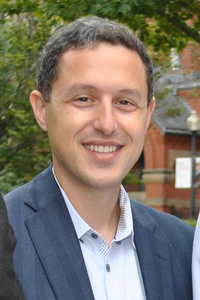“The greatness of community is most accurately measured by the compassionate actions of its members.” — Coretta Scott King Wow! What a Winter! Those who want snow - see too much grass, and those of us who prefer to fly to…
My AAOA Story

by Michael Platt, MD, FAAOA
Like many AAOA fellows, I was first exposed to the AAOA as a resident. At that time, the opportunity to travel was probably just as important to me as the educational value of the course. Most residents (myself included) consider surgical training as the highlight of residency training. Yet once in practice, new attendings (myself included) realize the benefits of allergy training in clinical practice. Over the past 10+ years in practice as a rhinologist, I cannot imagine how my practice would have been without having the allergy knowledge that the AAOA provided for me throughout my career. The ability to understand all facets of allergic disease has allowed me to better care for my patients in a comprehensive rhinology practice.
I’d like to reflect on an experience I had while looking for my first job coming out of fellowship. I remember interviewing with a large group practice which barred Otolaryngologists from practicing allergy. They thought it was more efficient to have medical allergists collaborate with Otolaryngologists. I was told that I could not practice allergy if I joined their practice. I was somewhat surprised that a practice would limit the scope of practice of their clinicians beyond what their board certification had specified. The ABOHNS certification for Otolaryngology includes the practice of allergy for good reason- allergy affects the ears, nose, and throat in many ways. Was their goal to provide better patient care with two physicians collaborating on every allergic patient? Was their model intended to increase referrals in their system? Did the physicians mind being limited in their scope of practice?
After 10+ years in practice, I have learned that there is great value in both incorporating allergy into a rhinology practice and collaborating closely with other allergy experts. I am proud to have outstanding colleagues in Allergy/ Immunology and Pulmonary Medicine who I collaborate with on a daily basis, at the same time as managing my own patients with allergic disorders. I believe that the mutual respect that I have encountered between other allergy practitioners and myself was enhanced by my abilities to understand allergic disease at the forefront of medicine, taught to me by the AAOA courses. I have been most impressed by the leadership efforts by AAOA education experts to continually update course materials and educational curricula.
With changes in how residents learn, where practitioners seek CME education, and the landscape of pharmaceutical support, challenges remain in how to best provide current residents with opportunity for allergy education during their residency training. I wonder if I would have been as successful in treating my patients had I not had the introduction to allergy in residency which the AAOA provided. As the AAOA plans their path for the future, I believe that it is essential part of the mission to lead resident education in allergy in parallel with the many offerings for practicing clinicians.





